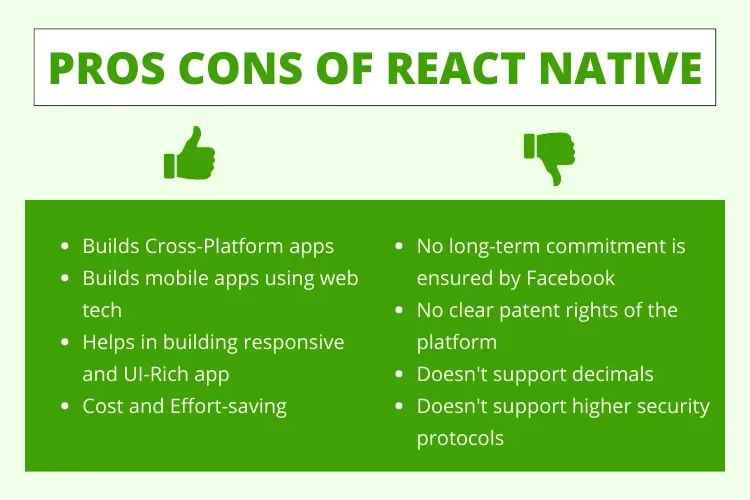In the modern era of rapid digital advancements, mobile app development stands as a vanguard of technological innovation. When embarking on the journey of crafting mobile applications, developers encounter a wealth of frameworks and technologies at their disposal. Among these, React Native, a framework nurtured by Facebook, has risen to prominence.
React Native has garnered substantial attention in recent times due to its potential for facilitating cross-platform development, empowering developers to construct mobile applications for both iOS and Android platforms utilizing a unified codebase. Nonetheless, akin to any technological endeavor, React Native brings along its own set of merits and drawbacks.
In this blog post, we will delve into the pros and cons of employing React Native for mobile app development.
Pros of Using React Native
Cross-Platform Development
One of the most significant advantages of React Native is its ability to facilitate cross-platform development. Developers can write a single codebase that works on both iOS and Android, reducing development time and effort significantly.
Code Reusability
With React Native, a substantial portion of the code can be reused across platforms. This means faster development, lower costs, and easier maintenance.
Native-Like Performance
React Native allows developers to build apps that deliver native-like performance. It achieves this by rendering components as native widgets, rather than using web views. This results in faster load times and smoother animations.
Large Community and Third-Party Libraries
React Native has a vast and active community of developers. This means access to a wide range of third-party libraries and components, which can speed up development and solve common problems.
Hot Reloading
React Native offers a feature called hot reloading, which allows developers to see the immediate effect of code changes without recompiling the entire app. This boosts productivity and debugging efficiency.
Cost-Effective
React Native can be a cost-effective choice for businesses as it requires fewer resources compared to building separate native apps for iOS and Android.
Cons of Using React Native
Limited Access to Native APIs
While React Native provides access to a wide range of native modules, some advanced or platform-specific features may not be readily available. Developers may need to write custom native modules or use third-party libraries to access these features.
Performance Variability
Although React Native apps can achieve near-native performance, there may still be some performance variability, especially for highly complex or resource-intensive applications. In such cases, native development might be a better choice.
Dependency on Facebook
React Native is an open-source project maintained by Facebook. Depending on a third-party framework can be a concern for some businesses, as the framework’s future direction and updates are not entirely under their control.
Larger App Size
React Native apps tend to have a larger file size compared to their native counterparts due to the inclusion of the React Native runtime. This can be a concern for users with limited storage space on their devices.
Limited Customization
While React Native provides a high degree of code reusability, it may not always offer the same level of customization and control over the user interface as native development.
Learning Curve
Developers who are new to React Native may face a learning curve, especially if they are more familiar with native development. Transitioning to React Native can take time and effort.
Conclusion
React Native is a versatile and efficient framework for mobile app development, offering a host of advantages such as cross-platform development, code reusability, and access to a thriving developer community. However, it’s essential to carefully evaluate your project’s specific needs and consider the potential drawbacks, including limited access to native APIs and performance considerations.
If you decide that React Native aligns with your project requirements and goals, the next crucial step is to find and hire React Native developers who are experienced and skilled in harnessing the full potential of this framework. By hiring competent React Native developers, you can ensure the successful execution of your mobile app project and leverage the framework’s strengths while mitigating its weaknesses.











